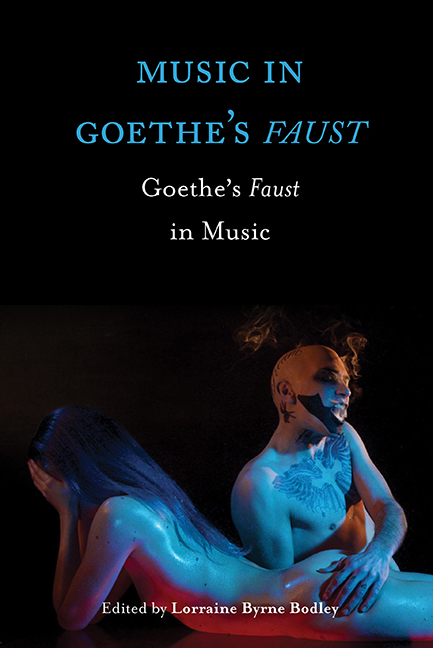Book contents
- Frontmatter
- Dedication
- Contents
- List of Illustrations
- Contributors
- Acknowledgements
- Abbreviations Used in the Notes
- Introduction. Rhapsody and Rebuke: Goethe's Faust in Music
- Part I Goethe's Faust: Content and Context
- 1 The Redress of Goethe's Faust in Music History
- 2 Wagering on Modernity: Goethe's Eighteenth-Century Faust
- 3 Reflectivity, Music and the Modern Condition: Thoughts on Goethe's Faust
- 4 Music and Metaphorical Thinking in Goethe's Faust: The Example of Harmony
- 5 Faust: The Instrumentalisation of an Icon
- Part II Legacies: Goethe's Faust in the Nineteenth Century
- Part III Topographies: Stagings and Critical Reception
- Part IV New Directions: Recent Productions and Appropriations
- Select Bibliography
- Index
5 - Faust: The Instrumentalisation of an Icon
from Part I - Goethe's Faust: Content and Context
Published online by Cambridge University Press: 30 August 2017
- Frontmatter
- Dedication
- Contents
- List of Illustrations
- Contributors
- Acknowledgements
- Abbreviations Used in the Notes
- Introduction. Rhapsody and Rebuke: Goethe's Faust in Music
- Part I Goethe's Faust: Content and Context
- 1 The Redress of Goethe's Faust in Music History
- 2 Wagering on Modernity: Goethe's Eighteenth-Century Faust
- 3 Reflectivity, Music and the Modern Condition: Thoughts on Goethe's Faust
- 4 Music and Metaphorical Thinking in Goethe's Faust: The Example of Harmony
- 5 Faust: The Instrumentalisation of an Icon
- Part II Legacies: Goethe's Faust in the Nineteenth Century
- Part III Topographies: Stagings and Critical Reception
- Part IV New Directions: Recent Productions and Appropriations
- Select Bibliography
- Index
Summary
Historical Faustus
Doctor Faustus emerges in vastly different guises in every age and culture following his appearance in late medieval times. Controversial from the outset, he has changed from villain to hero and, in the eyes of many, back to villain again, not at the mere whim of individual artists’ intent on reshaping the original material, but in accordance with the ever shifting values of successive epochs. The object of this chapter is to highlight key stages in the evolution of this extraordinary figure and thereby to convey a necessarily fleeting impression of some of the factors that made him an instrument of successive ideologies. The term ‘instrument’ is relevant in two senses: it reveals his dependence on each generation's necessarily shifting perspective, while at the same time referring to the playability and playfulness of the underlying theme. It is for this reason that Faustus has proved to be so attractive to the many musicians whose work is the focus of this volume. Their diverse settings and compositions are seen to mirror, complement and in some cases even anticipate literary reworkings of the theme.
Faustus is the product of an age from which few reliable documents have survived, but a lack of evidence has not prevented scholars from attempting to reconstruct elusive or absent data. A recent biography goes so far as to propose a precise date of birth, namely 23 April 1480. Wildly speculative as this suggestion may seem, it derives from a not totally implausible conjecture based on his first name. The given name most frequently associated with Faustus in the earliest sources is not Johann, as the chapbook would have it, and certainly not Heinrich, the alias employed by Goethe's seducer and hurled back at him by his distraught victim moments before her death. The earliest documents speak of Faustus as Jörg, a derivative of Georg or George. In those God-fearing times it was common practice to name children after the saint on whose day they were born; St George's Day is celebrated on 23 April.
- Type
- Chapter
- Information
- Music in Goethe's FaustGoethe's Faust in Music, pp. 86 - 98Publisher: Boydell & BrewerPrint publication year: 2017



